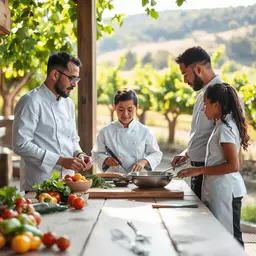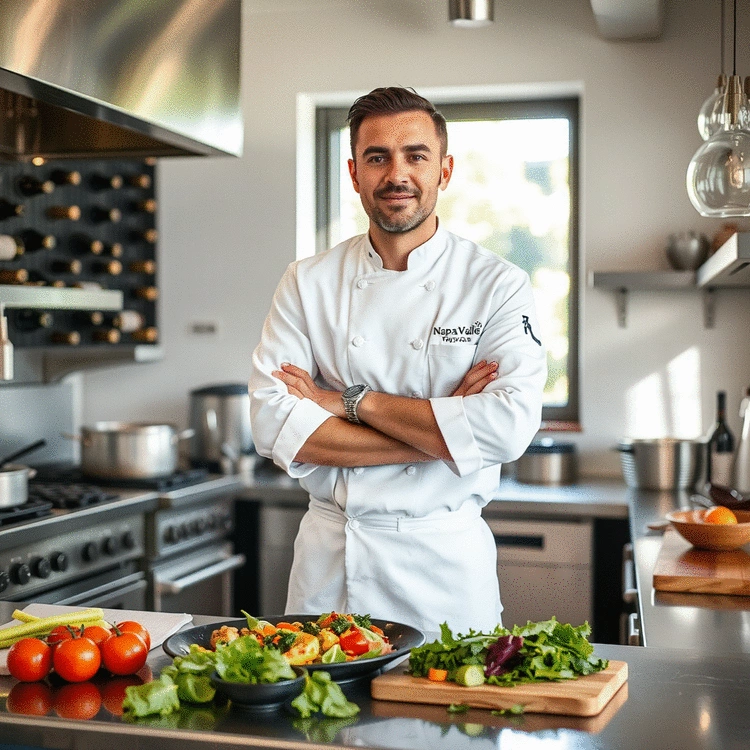
- Chef Insights
- Feb 06
2025-09-07
What if your next meal was a story waiting to be told? In Napa Valley, each dish is not just a plate of food but a celebration of the earth, its farmers, and the creativity of the chefs who honor it. As you delve into the culinary landscape of this vibrant region, you will uncover insights that can inspire both aspiring chefs and food enthusiasts alike.
Educational pathways and career prospects for aspiring chefs in Napa Valley are diverse and promising. Below is a comparison of key educational institutions and their offerings.
Offers comprehensive culinary training focused on local ingredient sourcing and hands-on experience.
Renowned for rigorous curriculum and an emphasis on global culinary techniques, preparing chefs for diverse environments.
Programs often include opportunities for real-world experience, important for building connections in the industry.
Certificates enhance credibility and open networking opportunities, increasing job prospects for certified chefs.
As I explore the culinary world of Napa Valley, I can't help but feel the pulse of creativity and passion that flows through every dish served. This region is renowned not just for its stunning vineyards, but also for its vibrant culinary arts that blend local ingredients with time-honored traditions. The food culture here is a rich tapestry woven with stories from farmers, chefs, and food enthusiasts who believe in the power of fresh, local produce. For more insights into the region's culinary talent, check out our article on Napa Valley's Notable Chefs.
In Napa Valley, chefs embrace a farm-to-table philosophy, ensuring that every meal tells a story of the land. With the surrounding fertile valleys providing an abundance of fruits, vegetables, and herbs, chefs have the unique opportunity to create dishes that reflect the seasons. Have you ever tasted a dish that felt like a celebration of the earth? Here, every plate is just that!
The culinary landscape in Napa Valley is a fusion of various influences. From classic French techniques to modern American dishes, chefs draw inspiration from diverse culinary traditions. This melting pot creates an exciting variety of dining experiences that cater to every palate.
Whether it’s a cozy bistro or a fine dining establishment, Napa Valley's restaurants are constantly reinventing themselves to showcase the best of what the region has to offer. Have you ever wondered what makes a meal unforgettable? In Napa, it’s the connection between the chef, the ingredients, and the story behind each dish that creates that magic.
For those dreaming of becoming a chef in this dynamic environment, there are numerous pathways to consider. Napa Valley boasts several culinary arts programs that provide aspiring chefs with the skills and knowledge they need to succeed. Institutions like Napa Valley College and The Culinary Institute of America (CIA) are at the forefront of culinary education.
These educational centers not only teach cooking techniques but also emphasize the importance of understanding the culinary business. Aspiring chefs learn about menu planning, food costing, and the art of presentation. This holistic approach equips them with the tools needed to thrive in Napa Valley’s competitive food scene. Discover more about Napa Valley Chef Skills that are essential for success.
At the Napa Valley Culinary Institute, students have access to an array of unique offerings designed to nurture their culinary passions. The institute focuses on creating an immersive environment where students can learn from industry professionals who are deeply connected to the local food community.
This blend of education and experience creates a nurturing environment for future chefs to flourish. They leave the institute not just with a diploma but with a deep appreciation for Napa Valley’s rich culinary heritage. Can you imagine stepping into the kitchen of your dreams, armed with the knowledge and skills gained from such an amazing program?
As I shift gears to explore the skills necessary for success in a professional kitchen, it’s clear that training and certification play a crucial role. Chefs who pursue culinary certificates often find themselves better prepared for the fast-paced demands of Napa's vibrant food scene.
Completing a culinary program not only enhances cooking skills but also teaches essential kitchen management techniques. Have you ever wondered how a chef maintains poise while juggling multiple orders? Through training, chefs learn to prioritize tasks and work cohesively within a team.
The journey to becoming a successful chef is paved with challenges and triumphs, and obtaining a culinary certificate is a significant milestone. This credential is recognized throughout the industry, signaling that a chef has met certain standards of excellence.
In Napa Valley, where culinary talent is celebrated, having a professional certificate can be a game-changer. Chefs who invest in their education often find themselves in high demand, as restaurants seek individuals who are not only passionate but also well-trained. Are you ready to take the plunge into the world of culinary arts? You might also want to explore Napa Valley's Finest Dining Spots to see where these skills are put to practice.
To thrive in Napa Valley's culinary environment, aspiring chefs need to master a variety of essential cooking techniques. These skills form the backbone of every successful dish, allowing chefs to express their creativity while delivering quality meals.
Acquiring these foundational skills helps aspiring chefs build confidence in the kitchen. With every chop, simmer, and plate arrangement, they learn how to tell a story through food. What flavors and techniques will you explore on your culinary journey?
In Napa Valley, the culinary philosophy is heavily rooted in the belief that the best dishes come from seasonal, locally sourced ingredients. Chefs embrace the changing seasons, creating menus that reflect the freshest produce available.
This commitment to seasonality not only enhances the flavor of dishes but also supports local agriculture. Imagine savoring a plate of vibrant vegetables, each bite a reminder of the earth’s bounty. It’s clear that in Napa Valley, food is more than just sustenance; it’s a celebration of the land and its people.
Did you know? Understanding the importance of seasonal ingredients can significantly enhance your culinary creations. Chefs who focus on what’s fresh and in season not only support local agriculture but also elevate the flavor profile of their dishes. Consider visiting local farmers’ markets to discover what’s available in your area, and let those ingredients inspire your next meal!
As the culinary landscape continues to evolve, Napa Valley's chefs are at the forefront of embracing modern trends. They are not just about crafting delicious dishes; they are also committed to sustainability and innovation. By integrating these elements into their cooking, they are redefining what it means to dine in this beautiful region!
One exciting trend is the use of sustainable practices. Many chefs are now focusing on minimizing waste, sourcing ingredients locally, and using organic products. This commitment not only supports the environment but also enhances the quality of the dishes served. Have you ever thought about how much better a meal tastes when you know it's good for the planet? For those visiting, dining in Yountville offers a prime example of this philosophy in action.
In Napa Valley, sustainability goes hand in hand with innovation. Chefs are experimenting with new technologies and techniques that help to preserve the integrity of their ingredients. Here are some ways they are achieving this:
These practices not only create delicious meals but also foster a sense of community among local producers and chefs. It’s a cycle of support that keeps the culinary spirit of Napa Valley thriving!
Without the passionate local farmers and artisan producers, Napa Valley's culinary scene would not be what it is today. Their dedication to providing high-quality, fresh ingredients directly influences the creativity and flavors found in local restaurants. Here’s how they make a difference:
As I wander through the local farmers' markets, I am always amazed by the vibrant colors and fresh scents of the produce. It’s a reminder of how close we are to the source of our food—it's just one of the many reasons I love exploring Napa’s culinary treasures.
Looking ahead, the future of culinary careers in Napa Valley is bright! As trends evolve, so do the opportunities for aspiring chefs. Here are some emerging trends and potential job paths:
These trends highlight the ever-changing nature of the culinary world. For those looking to start their career in this field, staying informed and adaptable is key!
As we reflect on the journey of becoming a chef in Napa Valley, it’s clear that education and passion are fundamental. The culinary programs available offer aspiring chefs a solid foundation, while the vibrant food scene provides endless inspiration. With the right training and a commitment to community, the possibilities are limitless.
It’s important to recognize the vital role that education plays in shaping culinary careers in Napa Valley. From hands-on training at the Napa Valley Culinary Institute to opportunities for mentorship, aspiring chefs have numerous resources at their fingertips. These factors not only prepare them for the challenges ahead but also open doors to exciting career paths. To learn more about chefs transforming the culinary scene, explore our insights on New Chefs Shaping Napa Valley.
To anyone dreaming of a culinary career, I encourage you to explore the programs available in Napa Valley! Whether you’re passionate about cooking, baking, or even food photography, there’s a place for you in this thriving community. Dive into this adventure, and let your culinary journey begin!
Here is a quick recap of the important points discussed in the article:
